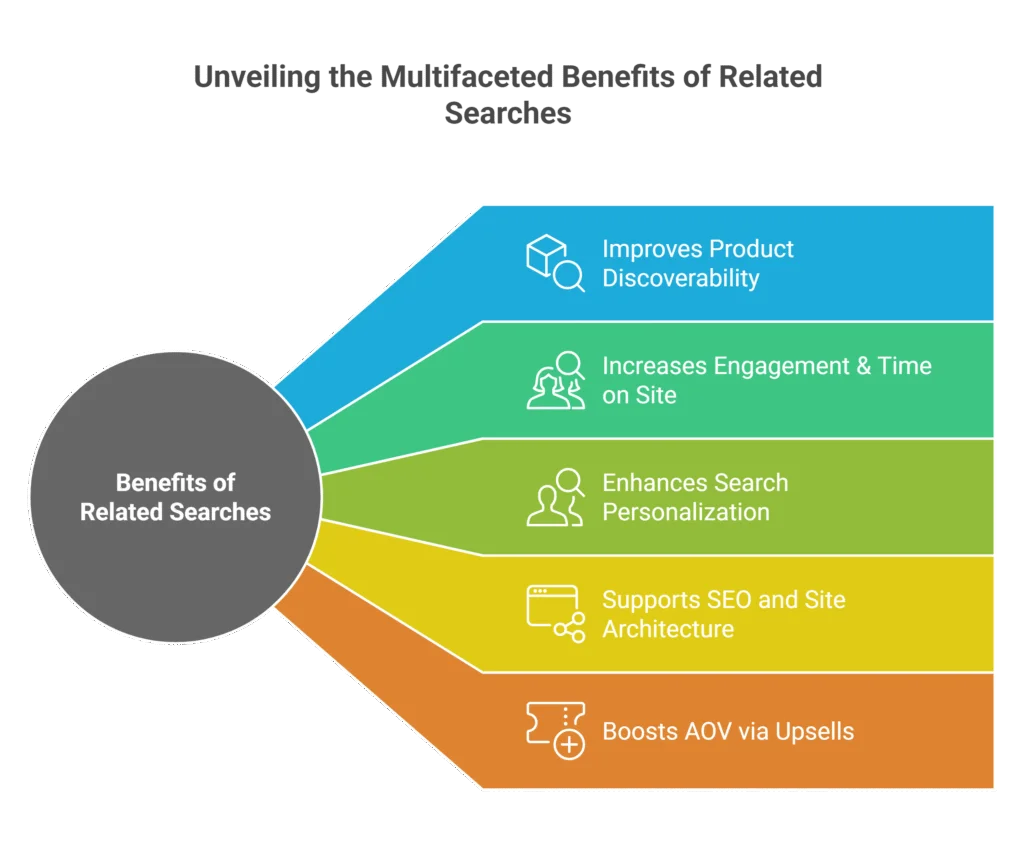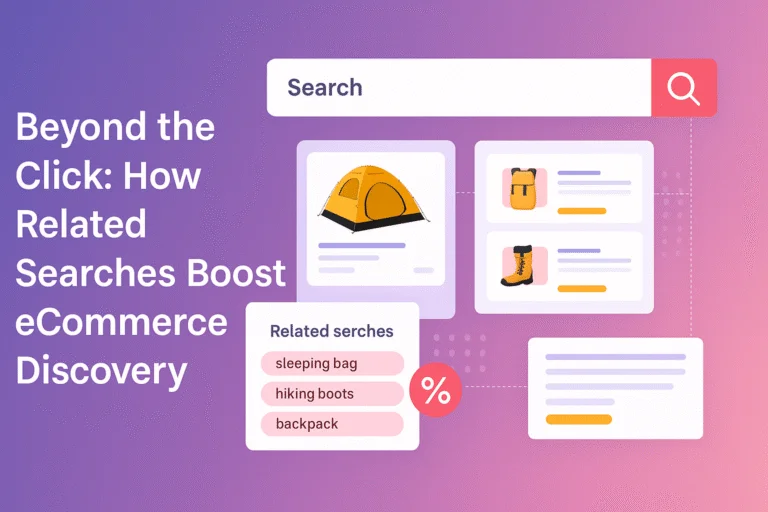Introduction: When One Search Isn’t Enough
Not every shopper knows exactly what they’re looking for. They may start with “laptop stand” but really want “adjustable desk riser.”
This is where related searches step in as silent conversion heroes.
In the world of eCommerce, related searches help guide users deeper into your catalog, uncover products they didn’t know they needed, and dramatically reduce bounce rate.
Let’s explore how related searches work, why they matter, and how to implement them effectively with tools like Expertrec.
What Are Related Searches?
Related searches are alternative or complementary search suggestions that appear alongside or after a user’s original query. They aim to:
- Expand product discovery
- Correct vague or mismatched queries
- Encourage deeper site exploration
- Upsell or cross-sell related items
In essence, they act as smart prompts that keep the shopping journey going.
Examples of Related Searches in Action
Let’s say a user types:
- Search Term: “Bluetooth speakers”
- Related Searches: “waterproof speakers,” “portable audio,” “smart speakers”
- Search Term: “running shoes”
- Related Searches: “trail running shoes,” “Nike running shoes,” “lightweight trainers”
- Search Term: “coffee mug”
- Related Searches: “travel mug,” “ceramic mug set,” “custom coffee cups”
These suggestions are both helpful and commercially strategic.
Benefits of Related Searches in eCommerce

1. Improves Product Discoverability
Surfaces products from deeper parts of your catalog that wouldn’t be found via a single keyword.
2. Increases Engagement & Time on Site
Users explore more queries and click more results, reducing bounce rate.
3. Enhances Search Personalization
Shows that your site understands intent and context.
4. Supports SEO and Site Architecture
Related searches lead to stronger internal linking and better keyword targeting.
5. Boosts AOV via Upsells
Suggestions often include premium or complementary items.
How to Implement Effective Related Searches
1. Use AI to Understand Intent
Leverage machine learning to analyze behavior patterns, synonyms, and co-search terms.
2. Track Popular Queries and Paths
Use analytics to see what users commonly search before and after a given keyword.
3. Balance Relevance with Diversity
Avoid showing variations that are too similar; instead, mix adjacent categories and styles.
4. Show Related Searches Strategically
Display them:
- Below the search bar (live suggestions)
- At the bottom of search result pages
- In no-results or low-results situations
5. Update Regularly Based on Trends
Seasonal behavior, new arrivals, or viral products should influence your related suggestions.
Related Searches vs. Autocomplete: What’s the Difference?
| Feature | Autocomplete | Related Searches |
|---|---|---|
| Timing | While typing | After search or in results page |
| Function | Completes the query | Expands query or offers new paths |
| Focus | Speed & prediction | Exploration & discovery |
| Example | Typing “lap…” = “laptop stand” | Searching “laptop” = “gaming laptops,” “2-in-1 laptops” |
Both are crucial, but related searches extend the user journey.
Expertrec: Smarter Related Search, Seamlessly Delivered
Expertrec’s search engine comes with powerful, AI-driven related search functionality that:
- Auto-suggests related queries based on user behavior
- Learns over time to improve suggestion accuracy
- Operates in real time with zero lag
- Requires no coding for integration
- Includes analytics to track usage and performance
Whether you’re on Shopify, Magento, WooCommerce, or a custom platform, Expertrec helps turn one search into many sales opportunities.
Conclusion
One search should never be the end of the story. With smart related searches, your site becomes a guided experience, not just a product shelf.
Use Expertrec to activate this powerful tool and help users discover more, buy more, and come back for more.
FAQs
1. What are related searches in eCommerce?
They are contextual search suggestions that help users explore related or complementary product queries.
2. Are related searches the same as autocomplete?
No. Autocomplete predicts your current query, while related searches suggest new paths after the initial search.
3. Why are related searches important?
They boost engagement, reduce exits, and surface more products without friction.
4. Can Expertrec enable related searches automatically?
Yes. Expertrec’s AI engine generates related queries in real time.
5. Do related searches improve conversions?
Absolutely. They lead to deeper catalog exploration and better product matches, which drives sales.




